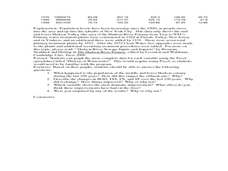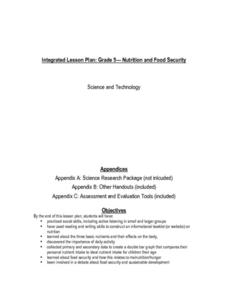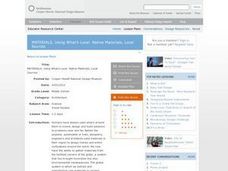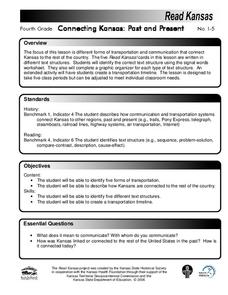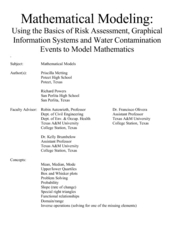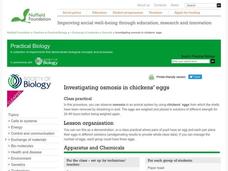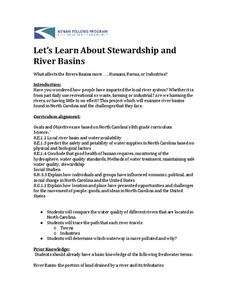ProCon
Vegetarianism
What do Mike Tyson, Ellen DeGeneres, and Paul McCartney have in common? They're all famous vegetarians. Using the resource, scholars learn about the pros and cons of eating a vegetarian diet. They read a fascinating history of...
Curated OER
Historical Pollution in the Hudson: Part 2
Ninth graders practice how to format and enter data into an Excel spreadsheet, make a graph, and interpret graphed data. They recognize how the pollution in the Hudson River has changed over time, and explain the consequences of these...
Curated OER
Nutrition and Food Security
Examine the three basic nutrients and their effects on the body. Fifth graders will research data to construct a bar graph and then demonstrate the relationship between malnutrition and food security. This is a very comprehensive...
Curated OER
MATERIALS, Using What’s Local: Native Materials, Local Sources
Middle schoolers consider the development of different societies. In this environmental building lesson, students consider local resources and how societies choose to use them. Middle schoolers use their findings to design a 'green'...
Curated OER
Connecting Kansas: Past and Present
Upper graders identify five forms of transportation and describe how Kansans are connected to the rest of the country using transportation and communication. They complete a graphic organizer for each type of text structure given to them...
Curated OER
Mathematical Modeling
Study various types of mathematical models in this math lesson. Learners calculate the slope to determine the risk in a situation described. They respond to a number of questions and analyze their statistical data. Then, they determine...
May Media Group
Treatment Plants
Young scientists explore nature's water treatment plants in this simple science demonstration. By placing a stalk of celery in a cup of water mixed with food coloring, children are able to observe how plants absorb nutrients and...
Earth Day Network
Healthy Earth, Sick Earth
Earth is sick and needs our help! Read the children's book Planet Earth Gets Well to explain the various problems facing the planet, discussing what young conservationists can do to heal the planet along the way. A great Earth Day...
Federal Reserve Bank
The Fed - Helping Keep Banks Safe and Sound
What does an examiner look for when analyzing a bank's financial condition? In addition to learning about the 5-Cs for reviewing loans and CAMELS (capital, assets, management, earnings, liquidity, and sensitivity to risk), your learners...
KOG Ranger Program
Managing Forests to Prevent Wildfires
Sometimes the best way to prevent forest fires is to create smaller fires. Explore forest management with an activity that explains the ways that controlled burns can keep unexpected fires from running amok in the wilderness and nearby...
Rainforest Alliance
How Do Jaguars and Howler Monkeys in Belize Depend on Us?
How does weather play a role in the lives of land and sea creatures? Find out with a instructional activity focused on habitats and the ways animals from different homes are connected. Here, learners explore how the life of a jaguar and...
Teach Engineering
Curb the Epidemic!
Class members use an applet on the Internet to simulate the spread of a disease. The simulation allows individuals to determine two nodes to vaccinate to limit the number of nodes infected. By running several simulations, scholars can...
Teach Engineering
Water Remediation Lab
Water filtration — that's pure genius! Groups test the ability of a water filter to purify water by running chlorine contaminated water through a filter and measuring the chlorine concentrations as they filter the water. They then graph...
Virginia Department of Education
The Germ Theory and Koch’s Postulates
Explore the history of cholera and its effect on society with your biology class. Young biologists will then proceed to grow their own germs, prepared from live cultures, and follow the steps of the scientific method to generate data....
Nuffield Foundation
Investigating Osmosis in Chickens' Eggs
You might not be able to learn through osmosis, but you sure can observe it! Scholars observe and measure osmosis using chicken eggs. They control for multiple variables to determine which variables have an impact and how the impact...
Kenan Fellows
Let's Learn About Stewardship and River Basins
What does it mean to be a good steward? Middle school environmentalists learn to care for their state's waterways through research, a guest speaker, and poster activity. Groups must locate and learn more about a river basin and the human...
Curated OER
Pizza Farm Activities
Students identify the food groups and agricultural sources of pizza ingredients. They construct a construction paper pizza, identify the crops grown for pizza ingredients, and make and eat English muffin pizzas.
Curated OER
The Potential Consequences of Climate Variability and Change
Learners analyze the impact of climate variability and change utilizing a broad span of topics over a wide range of grade levels. This three lesson unit is easily adapted for the various instructional levels listed.
Curated OER
What Does Earth Day Mean? - Biology Teaching Thesis
Young scholars possible sources of water pollution, and explain the effects that water pollution can have on the food on the food chain. They Name human and other animal (i.e. fish) illnesses that can be contracted from drinking polluted...
Curated OER
Amounts of Dissolved Oxygen in Various Bodies of Water
Young scholars test water to determine the dissolved oxygen content while displaying the proper use of testing instruments while visiting water testing sites. They determine if the amount of dissolved oxygen is appropriate for the tested...
Curated OER
Welcome to My World
Elementary schoolers discuss what a community is, and what their community has to offer them. They create posters, or flyers for the different businesses or places in their community to place around their school. After the learners have...
Curated OER
A Design You’ll Dig: Designing a Habitat for Worms
Students discover how worms contribute to the balance of the environment. In this composting lesson plan, students study the composting and decomposition processes. Students then create habitats for worms that allow them to do their jobs.
Curated OER
Smogasbord
When your environmental or earth science class is studying air pollution, you will want to take the time to go over this resource. Pupils peruse the history of air pollution regulations and examine outstanding diagrams of what...
Curated OER
Rental Agreement Lingo
The first time you sit down to sign a rental agreement is quite an experience. Prepare your class for that inevitable moment with a lesson on rental agreement lingo. They read a rental agreement, fill out a lingo worksheet, and then...



